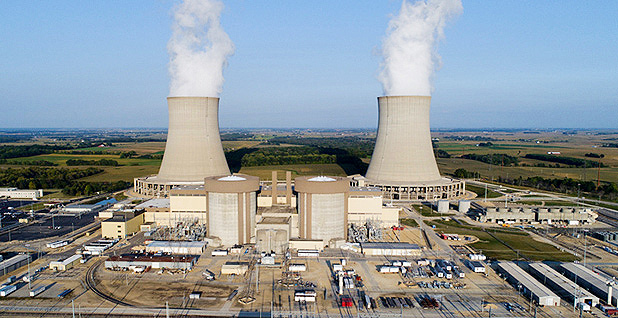The Byron nuclear power plant
Illinois governor J. B. Pritzker’s proposal to subsidize the state’s Byron and Dresden nuclear plants, introduced in legislative form last week, falls short, Exelon Corporation President and Chief Executive Officer Chris Crane said on May 5 during the company’s first-quarter earnings call.
“From what we’ve heard, it’s open to negotiation, but just going from the street analyst opinion and what we’ve seen, its starting point is not adequate to keep the plants’ continued operations going,” Crane stated.
Artist’s rendering of Kairos Power’s KP-FHR reactor. (Image: Kairos Power)
The Tennessee Valley Authority and nuclear technology and engineering company Kairos Power this morning announced plans to collaborate on the deployment of the latter’s low-power demonstration reactor, dubbed Hermes, at the East Tennessee Technology Park (ETTP) in Oak Ridge, Tenn. TVA will provide engineering, operations, and licensing support to help Kairos with deployment, according to the announcement.
Unit 3 of the Vogtle plant under construction (Photo: Georgia Power)
To reach President Biden’s goal of cutting U.S. carbon emissions in half by 2030 and to have a net-zero carbon economy by 2050, some environmentalists are reconsidering their opposition to nuclear energy’s role as a climate crisis solution. According to the article, The controversial future of nuclear power in the U.S., from National Geographic, nuclear power has a lot going for it. Its carbon footprint is equivalent to wind, less than solar, and orders of magnitude less than coal. Nuclear power plants take up far less space on the landscape than solar or wind farms, and they produce power even at night or on calm days.
The above figure provides NYISO's projected mix of resource capacity expected to be available for the 2021 Summer Capability Period.
The figure below shows the vast difference in 2020 between clean energy provided to upstate New York and to downstate New York. With the recent closure of Indian Point-3, the difference will widen for downstate New York in 2021.
NYISO released its 2021 power trends report for the state of New York. As noted by many in the energy community prior to the closure of Indian Point nuclear power plant's Unit 2 and Unit 3 in 2020 and 2021, respectively, the projected mix of resource capacity expected for downstate New York's energy generation will be heavily reliant on fossil fuels.
The Surry nuclear power plant, near Surry, Va. Photo: Dominion Energy
The Nuclear Regulatory Commission has approved Dominion Energy’s application to renew the Surry nuclear power plant’s operating licenses for an additional 20 years. The renewed licenses authorize the extension of reactor operation at the two-unit plant from 60 to 80 years.
Indian Point-3’s turbine hall and generator. Photo: Entergy
The disturbingly long list of U.S. nuclear plants prematurely closed in recent years will get even longer tonight when the last reactor at the Indian Point Energy Center, Unit 3, powers down for the final time. The shutdown, scheduled for 11 p.m. local time, will mark the end of nearly 60 years of zero-carbon electricity generation at the Buchanan, N.Y., facility.
Two of the state’s six nuclear plants nearly closed in 2016, but legislative action saved them. Now two more are at risk.
If there is one U.S. state you might think would be on top of the nuclear-plant-retirement problem, it’s Illinois: With 11 power reactors, more than any other state, it is number one in nuclear generating capacity. In 2019, 54 percent of its in-state generation came from nuclear power. So why, at this writing in mid-April, does Illinois still face the possibility of losing two of its nuclear plants later this year?
The Hope Creek nuclear power plant. Photo: Peretzp
New Jersey’s Board of Public Utilities (BPU) yesterday voted unanimously to extend, for an additional three years, the zero emission certificate (ZEC) program benefitting the state’s two operating nuclear power plants, Hope Creek and Salem. The two facilities produce more than 90 percent of New Jersey’s carbon-free electricity and about 40 percent of its overall power.
The CB-20 module is placed atop the Vogtle-4 containment vessel. Photo: Georgia Power
Georgia Power yesterday announced two significant milestones at the Vogtle nuclear plant’s expansion project: the commencement of hot functional testing at Unit 3 and the placement of Unit 4’s passive containment cooling water storage tank, known as CB-20.
Salem Nuclear Power Plant as photographed from Delaware Bay.
When a nuclear power plant closes, here is what happens:
Thousands of people lose their jobs. The local economy nosedives. Air pollution increases. Reliance on natural gas, often bought from out-of-state, goes up. Electricity on the grid becomes less reliable with the loss of the most reliable source of power. And electric prices can even rise.
 Nuclear News magazine has just released the 52nd annual Buyers Guide. This nuclear directory lists more than 600 companies worldwide in 475 business categories used throughout the nuclear community.
Nuclear News magazine has just released the 52nd annual Buyers Guide. This nuclear directory lists more than 600 companies worldwide in 475 business categories used throughout the nuclear community.
















 The decline in global carbon dioxide emissions recorded last year will not continue through 2021, a new report from the International Energy Agency concludes. Released last week,
The decline in global carbon dioxide emissions recorded last year will not continue through 2021, a new report from the International Energy Agency concludes. Released last week, 